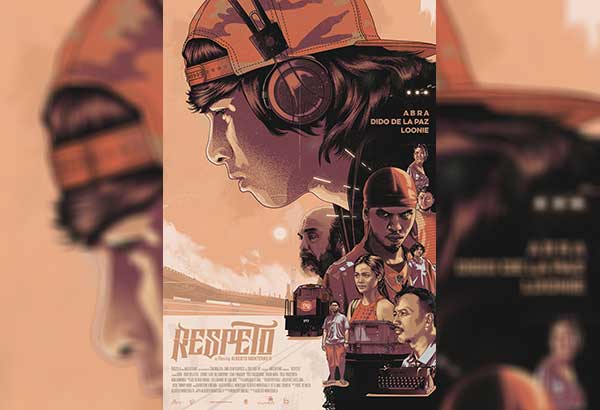From Balagtas to Gloc-9

Tokhang meets rap in Respeto’s underworld. Image from cinemalaya.org
It would be easy and comforting to praise director Treb Monteras’ Respeto as a testament to the redemptive power of poetry, to art as a transcendent force in the universe — but it’s not that simple.
Yes, there’s quite a bit of that, and happily so for occasional poets like this viewer. We want to believe, in our heart of hearts, that poetry will save us, will elevate us from the sordidness of our surroundings and from our own sad and sorry failings. Two of my favorite quotations about poetry, which I often bring up in class address that notion.
The first comes from that quintessential poet of the city, the Frenchman Charles Baudelaire: “When (like a poet) / the Sun descends into the city / It ennobles even / the vilest of its creatures.” So, poetry ennobles, raises up the poet from his or her pedestrian reality, no matter how vile that reality may be.”
The second comes from Anne Sexton, who took her own life at age 45 after a long bout with depression, but who could still understand that “Suicide, after all, is the opposite of poetry.” Poetry was the life-force, the contributor to the poet’s heightened state of being, as Sexton would advert to in another line: “Saints have no moderation, nor do poets, just exuberance.”
These ideas were swilling in my head hours after my wife Beng and I stepped out of the cinema, still trying to figure out what I was supposed to think. We had missed Respeto during its Cinemalaya screening — they ran out of seats for us at its last showing — but had heard great things about it and weren’t about to miss it again during its regular run.
The movie itself isn’t hard to follow, even for a pair of senior citizens whose virgin ears opened up to Pinoy battle rap (always good to learn something new) for the first time. The Brockaesque descent into the urban jungle is such a familiar move for Filipino filmmakers (Hamog and Pauwi Na most recently come to mind) that it’s practically a given, but Respeto deepens the milieu by opening a door to the hip-hop subculture that many middle-class and middle-aged moviegoers have no inkling about whatsoever.
The fast and furious exchange of expletives aside, you could take Respeto as an Araby-type coming-of-age story where a young man falls for a woman, tries to gift her with something marvelous, and fails in the effort but learns something about himself in the process. Well, it’s a lot more complicated than that, because many other dualities and intersections abound in the story beyond just man and woman: that between youth and age (Hendrix, played by the ace rapper Abra, and Doc, played by Dido de la Paz), between apartment and slum, between bookshop and bar, between wisdom and wit, between Balagtas and Gloc-9, between Marcos and Duterte, and even between people who suffer and die for their beliefs and those who simply die out of poverty and crime. And perhaps, in the end, the movie asks, are they really so different? Is there some overarching reality that yokes them all together?
That reality seems to be that they’re all Filipinos living in the time of tokhang, a reality that pointedly intrudes into the narrative at key points and provides the inevitable climax. The environment seethes with menace and aggression — from the verbal violence (and blatant machismo) of the rap battles to the chilling corruption of the rogue cop Fuentes (played with understated competence by Nor Domingo). Without providing too much of a spoiler, I’ll just say that there’s no happy ending here, no triumphant reversals of fortune where the good guy bucks the odds, wins the prize, and gets the girl.
A perceptive review online by Tristan Zinampan puts it this way: “Respeto tells us that — given the cyclical oppression of Philippine society — going your own way, resignation, and apathy are not enough a vehicle to escape. Injustice is widespread; there’s simply no room to hide in this little archipelago. Just because you’re looking up, it doesn’t mean the chains on your feet aren’t there.”
Respeto’s Pinoy ‘hood is fertile ground for confrontation between good and evil in all their forms, with life and art insistently if desperately seeking to survive in the most hostile environments, even within the rap arena itself, where originality seems to be at a premium. The movie’s consistent use of a cemetery as a place for the creation of new art in words and images highlights this struggle.
Ultimately, however, at least for this viewer, Respeto affirms the inescapability of politics — especially the politics that kills — in our society, and its intrusion into our most private spaces, our most fervent dreams. There’s no doubt that the film draws much of its appeal from its running political commentary, but it’s less the topical references that create Respeto’s critical value for me than the power games that define it, some larger than others.
My takeaway isn’t a soothing one: poetry won’t save us, but guns — maybe even a rock — could, if that’s what it takes to overcome evil. And then again, the poetry — the truly great poetry, like all great art — will survive all of us: killers, victims, and bystanders alike. Catch Respeto the next chance you get, maybe on the campus film circuit, and tell me what you think.
* * *
Email me at jose@dalisay.ph and visit my blog at www.penmanila.ph.



















